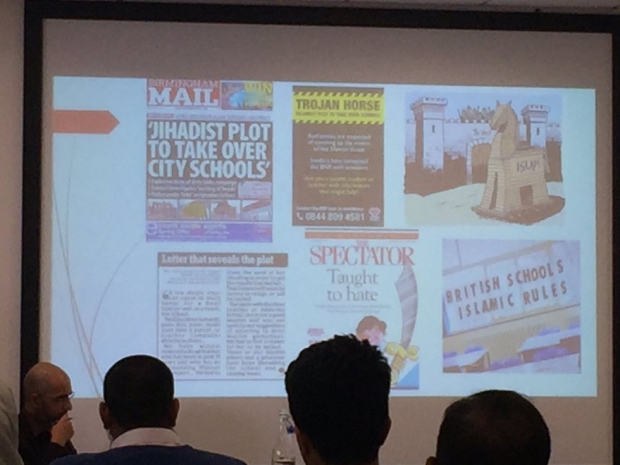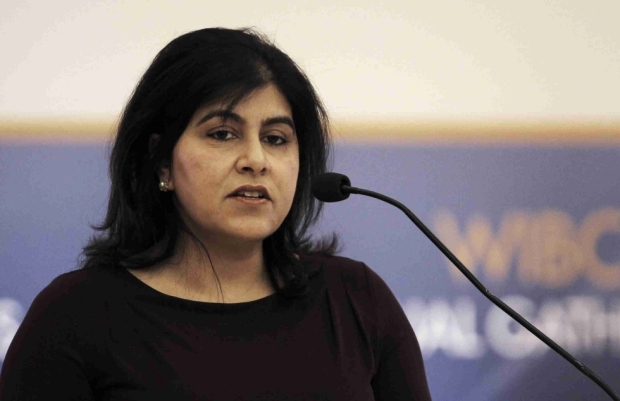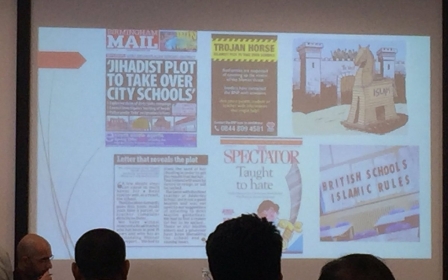Trojan Horse affair: When government and media colluded to vilify the Muslim community

Another week, another apology.
Two newspapers, The Sun and The Daily Telegraph, have retracted claims that there was a conspiracy to Islamicise schools in Oldham, a town in the Greater Manchester area of northwestern England. The Sunday Times, which broke the story, has not done so - not yet, at any rate.
The stories, written in February 2017, developed the theory that sinister Islamists are set on seizing control of British schools beyond Birmingham to the northwest of the country.
A culture of false reporting
Significantly, the apologies come in the week in which Sayeeda Warsi, who resigned from the David Cameron government in August 2014 due to its inertia over Gaza, spearheaded a fightback against the culture of false reporting about Muslims.
Speaking to the Home Affairs Select Committee, Warsi complained that no mainstream politician has made a speech about anti-Muslim prejudice since she did in 2011. She also presented a ream of cases of newspaper misreporting.
Warsi was critical, for example, of The Times' story last summer about the adoption of a Christian child by Muslim parents. She argued that such stories "poison the debate about the Muslim community" and have influenced the way politicians treat Islam.
There was, importantly, one crucial omission from the Warsi dossier.
There is mounting evidence that there never was a Trojan Horse conspiracy in Birmingham
So far there has been no investigation into the reporting of the original so-called Trojan Horse plot itself. I believe this is urgently needed. In March 2014, The Sunday Times reported that a group of Islamists had conspired to take control of schools in east Birmingham.
The story led to several government investigations, the most important of which was carried out by Peter Clarke, former Metropolitan Police counter-terrorism chief, for the Department for Education. In addition there were snap Ofsted inspections of 21 schools and tribunals into the conduct of 15 teachers.
More important still, the Trojan Horse affair has had a powerful effect on British government counter-extremism policy.
No Trojan Horse conspiracy
On the back of the Trojan Horse affair, in November 2014 the Department for Education announced that Ofsted would now censure schools for failing to "actively promote" what it calls "fundamental British values".
In 2015 the government cited Clarke's report as evidence of extremism in its new, emboldened counter-extremism strategy.
Yet there is mounting evidence that there never was a Trojan Horse conspiracy in Birmingham. After strong rebuttals and revelations that the Department for Education's lawyers had withheld evidence, all but one of the tribunal cases collapsed.
Many of the allegations made against the schools turned out to be unfounded. The Trojan Horse affair also forms the background to the latest row about hijabs in east London.
Ofsted chief inspector Amanda Spielman referenced the Birmingham case in all but name in her ill-judged intervention earlier this month.
I am certain that over time the story of the takeover of Birmingham schools will come to be seen as a gross abuse of natural justice and an attack on a vulnerable community.
A fundamental misunderstanding
For that reason I cannot recommend strongly enough Countering Extremism in British Schools? The Truth about the Birmingham Trojan Horse Affair, the recently published book by sociologists John Holmwood and Therese O'Toole. It is an assiduous, impeccably researched account of the events that took place in Birmingham. It makes utterly devastating reading.
And it is profoundly troubling in light of the official significance of the case. Holmwood and O'Toole dismantle Peter Clarke's report.
They show that Clarke's findings were based on a fundamental misunderstanding of the law concerning religion in British schools.
There is no such thing as a secular school in England. By providing opportunities for their almost all-Muslim pupils to practice their religion, the schools were merely performing their legal obligation.
Holmwood and O'Toole note Clarke's failure to mention that the school at the centre of his accusations, Park View - now renamed Rockwood Academy - did not take over and influence other schools because of an Islamist conspiracy. It did so but because the Department for Education itself had suggested it did!
There is no such thing as a secular school in England. By providing opportunities for their almost all Muslim pupils to practice their religion the schools were merely performing their legal obligation
And no wonder. Park View was an outstanding school in a deprived area. When it converted to an academy in 2012, the Department for Education pushed it to spread its practices elsewhere.
Worse still, Clarke took claims reported to him at face value and denied the accused the opportunity to provide their own accounts. Because of this negligence the Department for Education’s lawyers were unable to use Clarke’s report as evidence in the misconduct tribunals.
In this way, Holmwood and O’Toole explain, the Trojan Horse narrative was never dispelled.
Holmwood and O'Toole methodically lay bare the inconsistency of Ofsted's behaviour. They show that – in reports that Ofsted has now removed from its website – Ofsted explicitly commended Park View for the very things that it would soon condemn it for: the behaviour and safety of its children and the leadership and management of the school.
From 'outstanding' to 'inadequate'
In January 2012 Ofsted declared Park View "outstanding" in all areas. On a visit to the school, then chief inspector Michael Wilshaw commented that "all schools should be like it".
Its long-serving headteacher and chair of governors had transformed it from one of the worst schools in the country in the 1990s to one of the top 14 per cent.
Despite no significant changes in staff, governors or results, Ofsted declared the school "inadequate" in March 2014. Holmwood and O'Toole note that the initial Ofsted report of Park View was written after the Trojan Horse allegations emerged.
Just 11 days before inspectors would return for a second inspection to fail the school, they recommended reaffirming its outstanding rating.
With few exceptions, journalists failed to examine the underlying facts while repeating what turned out to be false allegations
Holmwood and O'Toole ask whether pressure was put on inspectors by the senior management at Ofsted or the Department for Education.
They also question the restoration of the school's Ofsted ratings - since the Trojan Horse affair - while under new, non-Muslim management, despite a collapse in results.
Importantly, they discuss the climate of media coverage that surrounded inspections in the spring of 2014. In the months that followed the revelation of the Trojan Horse letter, the media – including the Daily Mail, for whom I write a regular political column – reported scores of stories of Muslim intolerance: of children being taught that Western women were "white prostitutes," and of non-Muslims being referred to as "kaffirs," for example.
False narrative
With few exceptions, journalists failed to examine the underlying facts while repeating what turned out to be false allegations. Holmwood and O'Toole describe these reports as an instance of "moral panic ... where a scapegoating of marginalised groups in the context of a public anxiety is amplified by the press".
This all raises very serious questions – about truth, the strength of British democracy and the rights of its citizens.
When I spoke to Holmwood last week he compared this episode to the Hillsborough scandal, in which it took almost three decades of campaigning for the people of Liverpool to establish that 96 football fans had died not because of their own drunkenness but because of police negligence.
Holmwood said he could think of no other case in which the government and media had so destructively colluded to create a false narrative of events that vilified an entire community.
I could not agree more.
- Peter Oborne won best commentary/blogging in 2017 and was named freelancer of the year in 2016 at the Online Media Awards for articles he wrote for Middle East Eye. He also was British Press Awards Columnist of the Year 2013. He resigned as chief political columnist of the Daily Telegraph in 2015. His books include The Triumph of the Political Class, The Rise of Political Lying, and Why the West is Wrong about Nuclear Iran.
Additional reporting by Richard Assheton
The views expressed in this article belong to the author and do not necessarily reflect the editorial policy of Middle East Eye.
Photo: Pupils are seen eating lunch at Waverley School in Birmingham, Britain on 26 June 2015 (Reuters)
Middle East Eye propose une couverture et une analyse indépendantes et incomparables du Moyen-Orient, de l’Afrique du Nord et d’autres régions du monde. Pour en savoir plus sur la reprise de ce contenu et les frais qui s’appliquent, veuillez remplir ce formulaire [en anglais]. Pour en savoir plus sur MEE, cliquez ici [en anglais].







